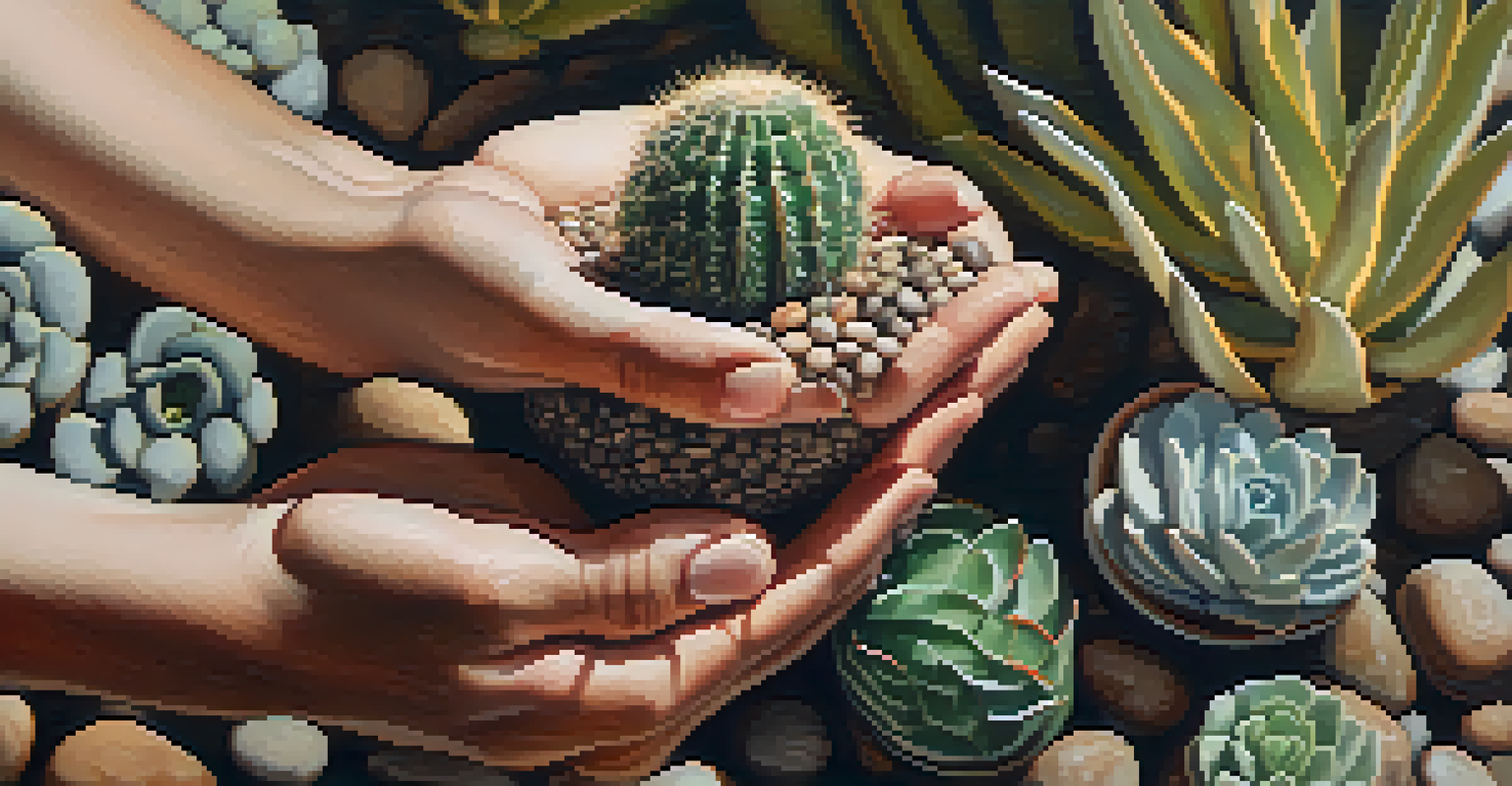The Role of Peyote in Indigenous Healing Practices Explained

Introduction to Peyote and Its Cultural Significance
Peyote, a small cactus native to North America, has been used for centuries by Indigenous peoples for its psychoactive properties. It is often regarded as a sacred plant, playing a vital role in spiritual and healing practices. The use of Peyote is deeply rooted in the cultures of tribes such as the Huichol and the Navajo, where it symbolizes connection to the divine and the natural world.
Psychedelic experiences can lead to profound personal growth and healing, connecting us to deeper aspects of ourselves and the universe.
For these communities, Peyote is not merely a substance; it embodies a bridge between the physical and spiritual realms. Its consumption is often part of religious ceremonies, emphasizing the importance of intention and respect in the process. This sacred act fosters a communal bond, where shared experiences enhance collective healing.
Understanding the cultural significance of Peyote helps to appreciate its role beyond medicine. It serves as a tool for introspection, guidance, and connection to ancestral wisdom, encouraging individuals to explore their own journeys toward healing.
Peyote in Traditional Healing Practices
In many Indigenous cultures, Peyote is incorporated into traditional healing practices that address not just physical ailments but also emotional and spiritual imbalances. Healers, often referred to as shamans or medicine men, guide individuals through Peyote ceremonies, which can last for hours and involve singing, drumming, and storytelling.

During these ceremonies, participants may consume Peyote to enter altered states of consciousness. This journey allows for introspection and the processing of trauma, leading to insights that might not be accessible in ordinary states of mind. The experience encourages participants to confront their fears, grief, and unresolved issues, facilitating profound personal growth.
Peyote's Cultural Importance
Peyote serves as a sacred plant in Indigenous cultures, facilitating spiritual connection and communal healing.
Moreover, the communal aspect of these ceremonies fosters a sense of belonging and support. As participants share their experiences, they create a collective healing environment, reinforcing the idea that healing is often a shared journey rather than an isolated one.
The Psychological Benefits of Peyote Use
Research into the psychological impacts of Peyote has revealed its potential benefits, especially for those dealing with anxiety, depression, and PTSD. The active compound in Peyote, mescaline, can induce altered states of consciousness that encourage emotional release and catharsis. This aspect has intrigued both researchers and mental health professionals.
The sacred plants are not just tools for healing; they are teachers that guide us to discover our true selves.
During Peyote ceremonies, participants often report feelings of unity and interconnectedness, which can drastically shift their perspectives on life’s challenges. These transformative experiences can lead to lasting changes in behavior and emotional well-being, suggesting that Peyote can serve as a powerful adjunct in therapeutic contexts.
However, it’s crucial to approach Peyote with respect and understanding of its cultural context. The therapeutic benefits observed in clinical studies emphasize the importance of integration with traditional practices, highlighting that the environment and guidance during the experience significantly influence its effects.
Legal Status and Ethical Considerations
The legal status of Peyote varies widely across different regions, often creating a complex landscape for its use. In the United States, the Religious Freedom Restoration Act allows certain recognized tribes to use Peyote in their spiritual practices. However, for non-Indigenous individuals, the legality of Peyote use remains a gray area, often restricted or illegal.
This legal ambiguity raises ethical questions about appropriation and respect for Indigenous traditions. Non-Indigenous individuals seeking to engage with Peyote must approach these practices with cultural sensitivity, acknowledging their sacred nature and the historical context of their use.
Therapeutic Potential of Peyote
Research highlights Peyote's benefits for mental health, particularly in addressing anxiety, depression, and PTSD.
Understanding these legal and ethical considerations is essential for anyone interested in Peyote. It encourages a thoughtful dialogue about cultural respect, the rights of Indigenous peoples, and the importance of preserving traditional healing practices.
Modern Applications and Research on Peyote
Today, interest in Peyote is experiencing a resurgence, particularly within the fields of psychology and alternative medicine. Researchers are exploring its potential as a treatment for various mental health conditions, as well as its applications in personal development and spiritual growth. This modern exploration is often framed within the context of traditional Indigenous practices.
Many contemporary studies highlight the importance of set and setting when using Peyote, emphasizing that the environment and mindset significantly affect the experience. This knowledge bridges traditional wisdom with modern scientific understanding, creating a holistic framework for healing.
As research continues, it’s crucial to remain grounded in the respect for Indigenous practices. Collaboration with Indigenous communities can ensure that the knowledge gained is shared ethically and that their cultural heritage is honored.
Challenges Facing Indigenous Healing Practices
Despite the growing interest in Peyote, Indigenous healing practices face numerous challenges, including cultural appropriation and environmental threats. As more people seek to experience Peyote, it’s essential to recognize the historical and ongoing struggles faced by Indigenous communities in protecting their traditions and sacred lands.
Furthermore, the overharvesting of Peyote poses a significant threat to its availability and the ecosystems where it grows. Conservation efforts are vital to ensure that future generations can access this sacred plant while maintaining the integrity of Indigenous practices.
Challenges for Indigenous Practices
Indigenous healing practices face threats from cultural appropriation and environmental issues, necessitating respectful collaboration.
Addressing these challenges requires a collaborative approach that respects the wishes and knowledge of Indigenous peoples. By supporting their rights and initiatives, we can help preserve these vital healing practices for years to come.
Conclusion: The Future of Peyote in Healing
The future of Peyote in healing practices lies in a delicate balance of respect, research, and preservation. As interest continues to grow, it’s essential to prioritize the voices of Indigenous communities and ensure that their traditions are honored and protected. The integration of modern research with traditional practices can create new pathways for healing while respecting cultural heritage.
Moreover, as we learn more about the psychological benefits of Peyote, it opens up discussions about how we can support mental health in culturally informed ways. This dialogue can help bridge gaps between Indigenous and non-Indigenous perspectives, fostering understanding and collaboration.

Ultimately, the role of Peyote in Indigenous healing practices is a testament to the enduring power of nature and culture in promoting wellness. As we move forward, embracing these teachings with humility and respect can lead to meaningful healing experiences for all.